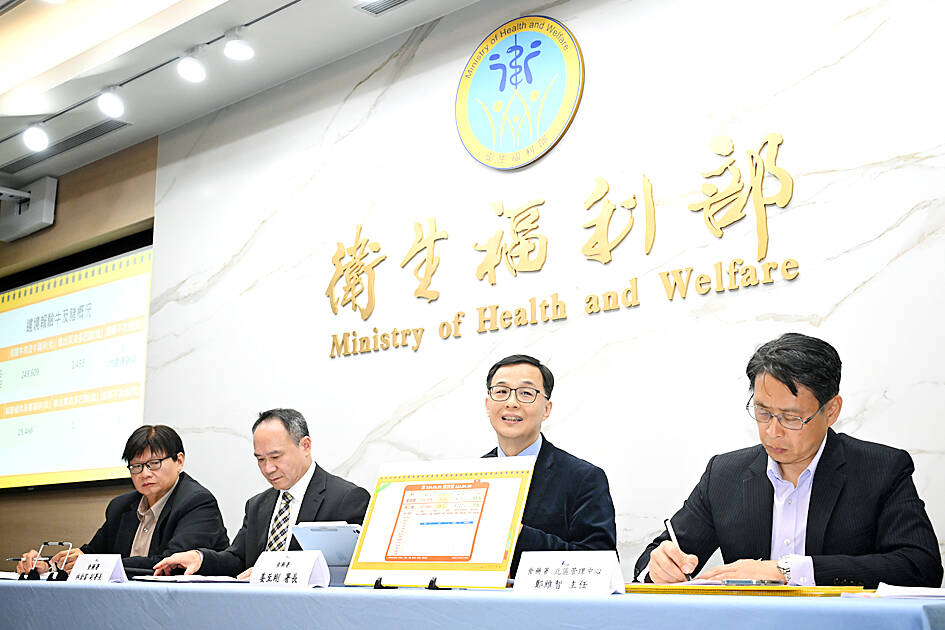The Food and Drug Administration (FDA) yesterday said that six batches of imported beef were found to contain ractopamine residues exceeding the legal maximum residue limit between 2012 and the end of last month, and all of the affected products were either returned or destroyed.
Local Chinese-language media on Sunday reported that a batch of imported pork had tested positive for ractopamine, an animal feed additive used in some countries to promote leanness in meat.
The report cited data from the FDA’s online pork monitoring dashboard, which showed that on Tuesday last week, a batch of pork imported from Australia tested positive for ractopamine at a concentration of 0.001ppm, which is a level within the maximum residue limit.

Photo: Chen Yi-kuan, Taipei Times
The detection was the first confirmed case of imported pork containing ractopamine since import restrictions were eased in 2021. The finding has raised concerns among several government agencies and lawmakers, prompting the administration to hold an impromptu news conference yesterday.
FDA Director-General Chiang Chih-kang (姜至剛) said the batch in question contained ractopamine at a concentration of 0.001ppm — one-tenth of the maximum residue limit of 0.01ppm — and was therefore legally permitted to enter the domestic market.
“Those that have passed border inspection would naturally be considered safe and be allowed to enter the domestic market,” he said, adding that food products sold domestically would also be randomly inspected.
Chiang said restrictions on imported beef containing ractopamine were eased in 2012, followed by the easing of restrictions on pork in 2021.
From Sept. 11, 2012, to April 30 last year, a total of 249,609 batches of imported beef underwent border inspection, with traces of ractopamine detected in 2,493 batches, he said.
Of these, six batches exceeded the legal maximum residue limit and failed inspection; all were either returned or destroyed, he added.
Between Jan. 1, 2021, and Wednesday last week, 25,466 batches of imported pork were inspected, and only one batch tested positive for ractopamine, and the concentration was within the legal limit, Chiang added.
Regarding random inspections of beef and pork products sold on the domestic market, Chiang said that of the 6,141 beef products tested, only one — a product imported from the US in 2021 — was found to contain ractopamine at 0.02ppm, exceeding the legal limit, while all 18,501 pork products tested during the same period passed inspection.
The administration’s online pork monitoring dashboard is intended to promote transparency by informing the public of inspection results, he said.
If any food product passes inspection, it is considered safe and falls within scientifically assessed, acceptable risk levels, he added.
The FDA said that current border inspection rates for imported pork range from 2 to 10 percent, and the frequency might increase for importers whose shipments have failed inspection.
However, since all imported pork batches have passed inspection for ractopamine residues, the administration does not plan to increase inspection frequency at this time, Chiang said.
The agency would not disclose the name of the importer or the distribution details of the batch that tested positive within the maximum residue limit, he said.

The manufacture of the remaining 28 M1A2T Abrams tanks Taiwan purchased from the US has recently been completed, and they are expected to be delivered within the next one to two months, a source said yesterday. The Ministry of National Defense is arranging cargo ships to transport the tanks to Taiwan as soon as possible, said the source, who is familiar with the matter. The estimated arrival time ranges from late this month to early next month, the source said. The 28 Abrams tanks make up the third and final batch of a total of 108 tanks, valued at about NT$40.5 billion

Two Taiwanese prosecutors were questioned by Chinese security personnel at their hotel during a trip to China’s Henan Province this month, the Mainland Affairs Council (MAC) said yesterday. The officers had personal information on the prosecutors, including “when they were assigned to their posts, their work locations and job titles,” MAC Deputy Minister and spokesman Liang Wen-chieh (梁文傑) said. On top of asking about their agencies and positions, the officers also questioned the prosecutors about the Cross-Strait Joint Crime-Fighting and Judicial Mutual Assistance Agreement, a pact that serves as the framework for Taiwan-China cooperation on combating crime and providing judicial assistance, Liang

A group from the Taiwanese Designers in Australia association yesterday represented Taiwan at the Midsumma Pride March in Melbourne. The march, held in the St. Kilda suburb, is the city’s largest LGBTQIA+ parade and the flagship event of the annual Midsumma Festival. It attracted more than 45,000 spectators who supported the 400 groups and 10,000 marchers that participated this year, the association said. Taiwanese Designers said they organized a team to march for Taiwan this year, joining politicians, government agencies, professionals and community organizations in showing support for LGBTQIA+ people and diverse communities. As the first country in Asia to legalize same-sex

MOTIVES QUESTIONED The PLA considers Xi’s policies toward Taiwan to be driven by personal considerations rather than military assessment, the Epoch Times reports Chinese President Xi Jinping’s (習近平) latest purge of the Chinese People’s Liberation Army (PLA) leadership might have been prompted by the military’s opposition to plans of invading Taiwan, the Epoch Times said. The Chinese military opposes waging war against Taiwan by a large consensus, putting it at odds with Xi’s vision, the Falun Gong-affiliated daily said in a report on Thursday, citing anonymous sources with insight into the PLA’s inner workings. The opposition is not the opinion of a few generals, but a widely shared view among the PLA cadre, the Epoch Times cited them as saying. “Chinese forces know full well that